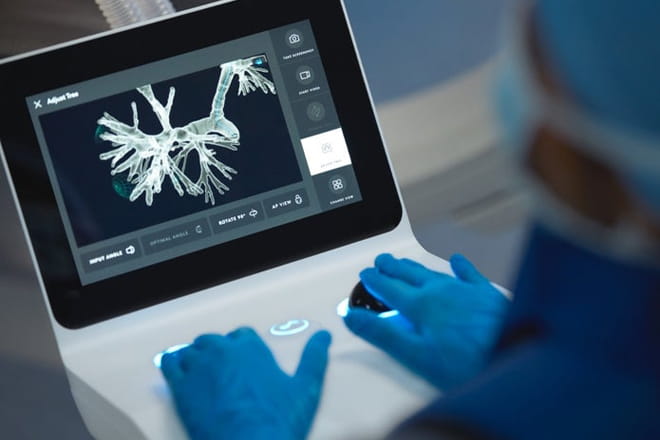The Ion robotic-assisted bronchoscopy is a minimally-invasive technology that improves accuracy and precision of the biopsy of a suspicious nodule. A nodule is a small mass or lump of tissue that could be benign or cancerous. Ion represents an advancement in the existing approaches to lung biopsy by enabling physicians to obtain tissue samples from deep within the lung.
Previously, when a patient met the clinical criteria and required a biopsy of a nodule on the lungs, doctors were not able to reliably biopsy the nodule through a bronchoscopy if it was less than 2 centimeters. That means the patient would need to either return at a later date to see if the nodule had grown or undergo lung resection surgery without an established diagnosis.
With robot-assisted bronchoscopy, doctors can biopsy nodules as small as 1 centimeter, potentially diagnosing lung cancer earlier. The system features an ultra-thin catheter that allows physicians to safely navigate far into the peripheral parts of the lung where tumors are harder to reach for biopsy.
The first case at Ascension Sacred Heart was performed May 12 by thoracic surgeon Dr. Anthony Holden and Pensacola pulmonologist Dr. Peter Bercz.
Lung cancer is the leading cause of cancer deaths, in part because lung cancer is often diagnosed at a later stage than some other cancer. However, when diagnosed at the earliest stage, the average 5-year survival rate is 92 percent.
Using this new technology, doctors can create a roadmap to access the lung nodule before they even begin the procedure. Then, a doctor controlling the robot can access the nodule by guiding a catheter to it using the roadmap and a camera.
“We are currently following patients who could potentially have lung cancer, but have smaller nodules, meaning they were previously unable to be biopsied safely through bronchoscopy. Now, we’re able to bring many of these patients back sooner and provide them with some answers,” said Dr. Peter Jennings, chief medical officer at Ascension Sacred Heart. “We’re excited to be able to provide this potentially life-saving technology to our community.”
For more information about Ascension Sacred Heart's lung cancer screening program, call 850-416-LUNG (416-5864) or visit our website.
The Ion robotic-assisted bronchoscopy system is manufactured by Intuitive, maker of the da Vinci surgical systems designed to help surgeons perform minimally invasive surgery.

